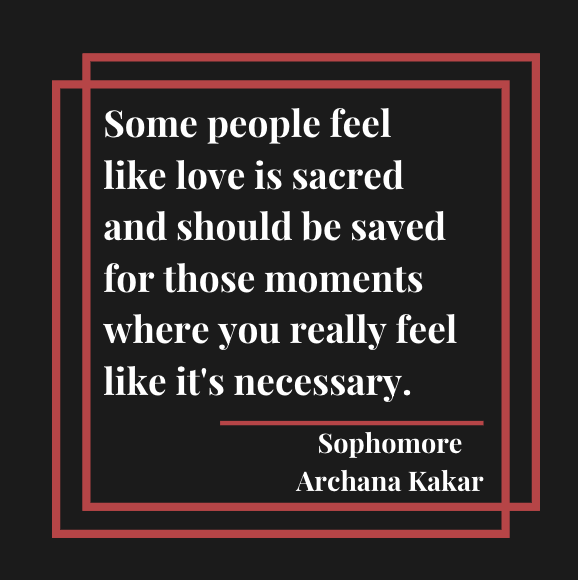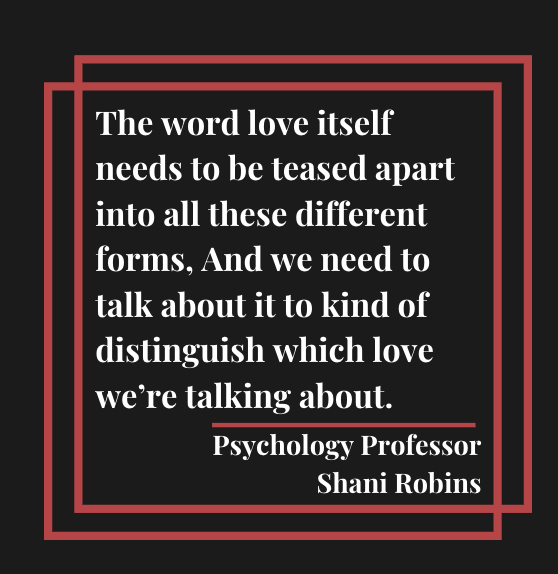A sigh of relief escapes sophomore Archana Kakar, now that she finally understands the math problem she was struggling with. She brushes off the eraser shavings and turns to her friend who helped her, “I just love you so much” she says. This is a phrase Kakar often uses in casual situations, which she says demonstrates her appreciation to close friends.
There are many dictionary definitions for the word “love,” with the Oxford English Dictionary describing it as “a feeling or disposition of deep affection or fondness for someone” and “a great interest and pleasure in something.” While these are the modern definitions, some MVHS students like Kakar use and view the word in a different manner.
“Some people feel love is sacred and should be saved for those moments where you really feel it’s necessary,” Kakar said. “[But] some people are ok with throwing it around casually.”

Sophomore Oren Buller believes the word carries a heavy weight. In contrast with Kakar’s unrestrained use of “love” towards her friends, Buller believes the excessive use of the word is unnecessary.
“I think the word ‘love’ can be used much more often when you’re talking about something that’s non-human,” Buller said. “But if it’s with another person, unless you are in a romantic relationship, it should not be used.”
Buller often uses the word absentmindedly to describe a liking toward an object. However, when Buller hears its usage in non-romantic settings, he thinks using the word might reflect an insecurity or someone’s need for affirmation.
“Love is a strong word,” Buller said. “The word love is [rarely] used to define how [one] person feels for another [and] more to define how they want them to feel. It’s something used to make someone think that they love them, and thus hopefully force a reciprocation.”
As a Social Science Professor at Foothill College and psychologist in private practice, Shani Robins believes the way someone uses the word “love” is based on how they heard it being used throughout childhood.
“What we experienced in childhood dramatically influences our sense of what love is,” Robins said. “Observational learning is a very powerful thing in childhood. Kids are constantly watching what the adults are doing and parents are doing.”
For example, Robins says a child observing dysfunctional love will begin to associate those sentiments with the word even into adulthood. As a result, this changes the meaning of the word for each individual. Robins states the combination of both the word and action is what gives love its true meaning.
“What’s happening underneath is a lot more important than just what the words are,” Robins said. “When nonverbal cues and the verbal cues collide or contradict each other, people go with the nonverbal cues. People believe not what you say but what you actually do.”
This argument is supported by Kakar, who states there are times where she shows the people around her she loves them through her actions instead of words. Robins also notes that there are many types of love including romantic, platonic and material. For example, he says someone saying they love ice cream as opposed to their friend or partner are very different.
“The word love itself needs to be teased apart into all these different forms,” Robins said. “And we need to talk about it to kind of distinguish which love we’re talking about.”

Robins notes that the different perception of words, including “love,” can be explained by psycholinguistics, the study of the interaction between psychology and linguistics. This field of study carefully considers how tone, syntax and emotion affect how words are received by the brain. For example, when someone says “I love you” with a friendly versus a serious tone, the brain processes it differently by adding its own inferred meaning.
“It’s unrealistic to think that we’re going to use a word in a bunch of contexts in different ways and it won’t impact the emotional impact that the word has,” Robins said. “I think it may be fun sometimes to say, ‘I just love you for doing that.’ It’s kind of a friendly, affectionate exclamation. But if it’s overdone to some extent, it could start taking away from the meaning when it’s really deep.”
Robins understands that words can be overused and taken too far, but he does not believe that this diminishes the value they are capable of holding, or the emotions they can convey. Additionally, Robins says while we can forget about its significance by hearing it so often, the meaning of the word and its beauty will never change.
“I think [love] is one of the deepest words and concepts of language,” said Robins. “Love is probably one of the most beautiful concepts in nature.”










